| Srl | Item |
| 1 |
ID:
000790
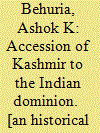

|
|
|
|
|
| Publication |
New Delhi, South Asian Centre for Strategic Studies, 1999.
|
| Description |
25p.Pbk
|
|
|
|
|
|
|
|
|
|
|
|
Copies: C:1/I:0,R:0,Q:0
Circulation
| Accession# | Call# | Current Location | Status | Policy | Location |
| 042194 | 954.6/BEH 042194 | Main | On Shelf | General | |
|
|
|
|
| 2 |
ID:
104448
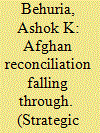

|
|
|
| 3 |
ID:
012368
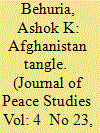

|
|
|
|
|
| Publication |
1997.
|
| Description |
3-15
|
|
|
|
|
|
|
|
|
|
|
|
|
|
|
|
| 4 |
ID:
097304
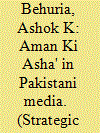

|
|
|
| 5 |
ID:
021263
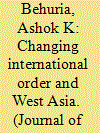

|
|
|
|
|
| Publication |
2002.
|
| Description |
29-42
|
|
|
|
|
|
|
|
|
|
|
|
|
|
|
|
| 6 |
ID:
083923
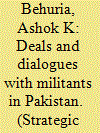

|
|
|
| 7 |
ID:
093869
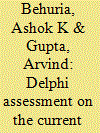

|
|
|
| 8 |
ID:
111282
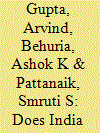

|
|
|
|
|
| Publication |
2012.
|
| Summary/Abstract |
The article argues that India does not have a well-defined neighbourhood policy. It makes a historical survey of the approaches of different Indian leaders to the neighbourhood and examines the reasons for the prevailing negative perceptions about India in the region. It argues that these negative perceptions have come about because India has largely adopted an ad hoc and bilateral approach vis-à-vis its neighbours and has allowed its policy to be guided by an overarching concern for security. In recent years, India's approach has changed considerably. However, it needs clearer articulation. The article suggests that India must effectively communicate its vision of regional integration to its neighbours, enable them to participate profitably in its growing economy, spell out its 'non-negotiables' in matters concerning its security and national interest, maintain linkages at the highest political level, open multiple tracks of communication and take a leadership position in multilateral forums like SAARC and BIMSTEC to bring peace and prosperity to the region through greater cooperation in diverse areas. This will prove effective in improving its relations with its neighbours.
|
|
|
|
|
|
|
|
|
|
|
|
|
|
|
|
| 9 |
ID:
047705
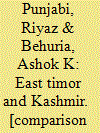

|
|
|
|
|
| Publication |
New Delhi, International Centre for Peace Studies, 2000.
|
| Description |
29p.
|
| Series |
Occasional paper: studies in peace and conflict
|
|
|
|
|
|
|
|
|
|
|
|
Copies: C:1/I:0,R:0,Q:0
Circulation
| Accession# | Call# | Current Location | Status | Policy | Location |
| 043639 | 320.9598/PUN 043639 | Main | On Shelf | General | |
|
|
|
|
| 10 |
ID:
069145
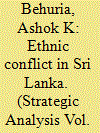

|
|
|
| 11 |
ID:
021905
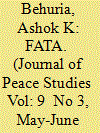

|
|
|
|
|
| Publication |
2002.
|
| Description |
19-36
|
|
|
|
|
|
|
|
|
|
|
|
|
|
|
|
| 12 |
ID:
079858
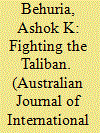

|
|
|
|
|
| Publication |
2007.
|
| Summary/Abstract |
Some new groups calling themselves Pakistani Taliban with links to the Afghan Taliban have asserted themselves in the tribal areas of Pakistan. This has complicated the internal security scenario for Pakistan. This article traces the roots of the problem and argues that the State with its confessional character emits strong Islamist impulses making it easy for Taliban-like forces to take roots in Pashtun dominated areas in Pakistan. While the process of Talibanisation may not succeed in engulfing the entire state of Pakistan, it will certainly pose a critical internal challenge, contributing to its fragility and compelling Pakistan to stay perennially engaged with its internal security. Roll back is difficult but not impossible. This will involve the strong commitment of the State to take steps to bring about social, economic and political transformation in the Taliban-infested areas, and an effort on the part of the international community to help Pakistan in this critical endeavour.
|
|
|
|
|
|
|
|
|
|
|
|
|
|
|
|
| 13 |
ID:
081463
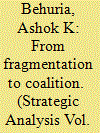

|
|
|
| 14 |
ID:
012848
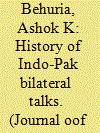

|
|
|
|
|
| Publication |
1997.
|
| Description |
32-61
|
|
|
|
|
|
|
|
|
|
|
|
|
|
|
|
| 15 |
ID:
089266
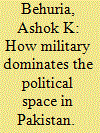

|
|
|
| 16 |
ID:
056346
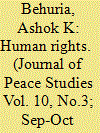

|
|
|
| 17 |
ID:
147211
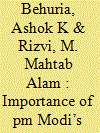

|
|
|
|
|
| Summary/Abstract |
Prime Minister Narendra Modi’s visit to Iran is important in many ways. It came at a time when India is seriously contemplating activation of its ‘Look West’ policy and banking on Iran as a ‘gateway’ and provider of a corridor to Central Asia and Afghanistan. The visit sought to revitalise India–Iran bilateral relations which has passed through an uncertain phase during the last decade.
|
|
|
|
|
|
|
|
|
|
|
|
|
|
|
|
| 18 |
ID:
144563
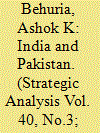

|
|
|
|
|
| Summary/Abstract |
Intelligence sharing by the Pakistani National Security Advisor (NSA) with his Indian counterpart in early March 2016 came up as an interesting outcome of the ongoing engagement between them since December 2015. Such exchange of critical information has raised the levels of expectation among the peaceniks in the subcontinent about the prospects of peace talks between the two countries, after a whole series of false starts since 2008.
Media reports in India termed it ‘unprecedented’1 and regarded it as ‘a new layer’ to India–Pakistan ties, while editorials in Pakistani English media hailed it as ‘timely, relevant and cooperative’, which could ‘clear the path for a full-fledged re-engagement’, and recommended that ‘regular interaction, sharing of information and mutual capacity-building will increase the trust between both governments—a key commodity severely lacking between the two neighbours’.
Does it indicate a change of mindset in the Pakistani military establishment and signal an ‘across-the-board fight against terrorism’ by the Pakistani state, as an editorial in the daily Dawn (March 10, 2016) (a leading Pakistani daily English newspaper) suggested? Is it aimed at changing the contours of the India–Pakistan relationship leading to a full-fledged resumption of dialogue or a minor flash in the pan? It is useful to closely analyse the development in light of the optimism that the report has engendered in India and Pakistan.
|
|
|
|
|
|
|
|
|
|
|
|
|
|
|
|
| 19 |
ID:
088498
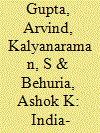

|
|
|
|
|
| Publication |
2009.
|
| Summary/Abstract |
India-Pakistan relations have been on a roller coaster. They reached a new low after
the Mumbai terror attacks of November 26, 2008. Tensions increased to such an
extent that the possibility of a war was openly talked about on both sides. However,
only a couple of hours before the attacks, the foreign ministers of the two countries
had appeared upbeat about the state of the peace process and the composite dialogue
which had started in January 2004.
The post-Mumbai situation brings to mind the Kargil episode of May 1999. A few
months before units of Pakistan's Northern Light Infanty were discovered in the icy
heights of Kargil, India and Pakistan were enjoying the honeymoon that had begun
with Prime Minister Vajpayee's visit to Lahore. Vajpayee's visit to Lahore, also
known as the Lahore Bus Yatra, was an attempt by the two sides to normalize the
bilateral relationship after the May 1998 nuclear weapons tests. Even as the Prime
Ministers of India and Pakistan were signing documents to normalize the relationship,
the Pakistan Army was planning intrusions into Indian territory. After the Pakistan
Army was forced to withdraw from the Kargil heights by Indian military operations
and international condemnation and pressure, the elected civilian government was
overthrown by the then Army Chief, General Parvez Musharraf, who ruled the
country for the next nine years.
|
|
|
|
|
|
|
|
|
|
|
|
|
|
|
|
| 20 |
ID:
101649
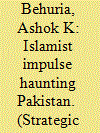

|
|
|